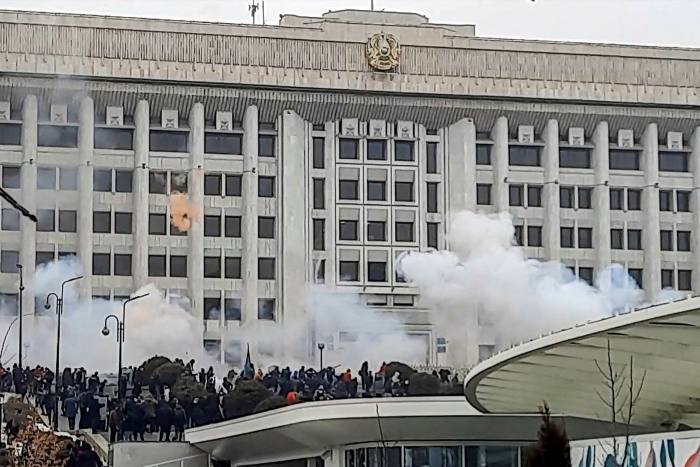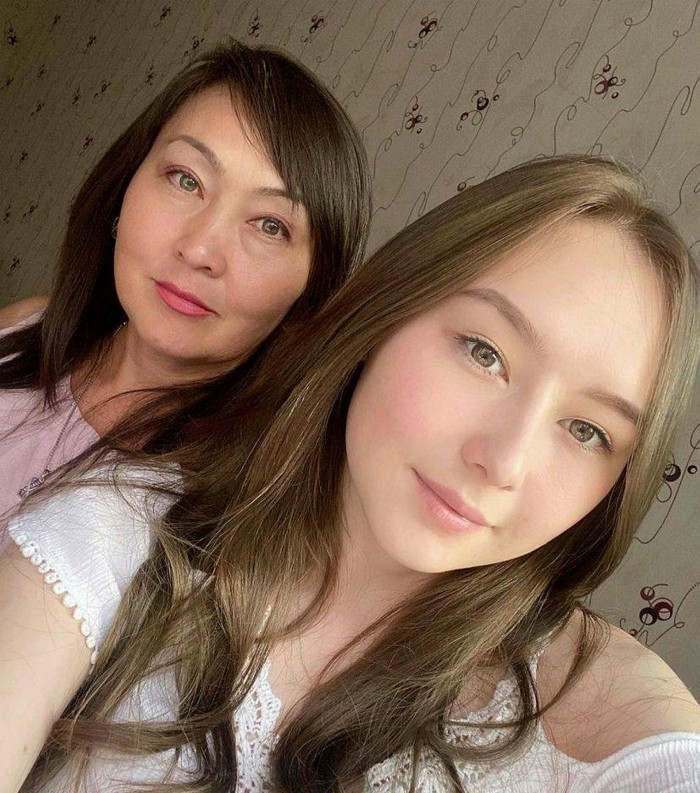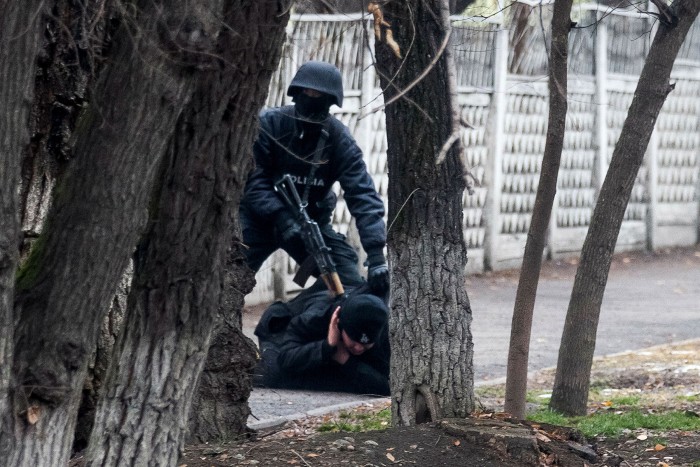Aset Abishev was among the first protesters to take to the streets in Kazakhstan’s biggest city Almaty last week and one of the first to be arrested. After four days in detention, he emerged covered in bruises that he said were the result of being tortured and beaten.
“The police department, all five floors, was a kind of a torture conveyor. Screaming could be heard from every window,” the longtime opposition activist alleged. “The tortures were horrific. They put bags on young people and strangled them. They beat people, jumped on those lying on the floor.
“These were ordinary citizens who were grabbed on the street, passers-by, taxi drivers,” he added.
The largest and most violent protests in Kazakhstan’s history broke out at the start of this month in the western city of Zhanaozen over a fuel price rise.
By the time they were quelled nearly a week later, the demonstrations had spread across the country, mushrooming into wider protests about poverty, corruption and the influence of former leader Nursultan Nazarbayev. The unrest prompted the government to resign and President Kassym-Jomart Tokayev to ask Russian-led forces from former Soviet states for help.
Government buildings were torched and the president ordered security forces to shoot “without warning”. More than 160 people, including police officers, were killed. According to earlier official estimates, over 10,000 people had been arrested, although on Friday the president said 2,000 had been detained.

Tomiris Izgutdinova, a 20-year-old Almaty student did not join the protests. But her mother, Nuraliya Aytkulova, was gunned down on the way to her daughter’s home. Shot twice in the chest, she was found bruised and battered on the city’s Republic Square, said Izgutdinova. It is unclear who fired the shots that killed her.
“Only this vile government is to blame,” said Aytkulova’s brother, Nuraybek. “It has to change. What is happening is horrible. They are switching places in the government, while common people can barely survive. And when they speak out, they are smashed and literally mixed with dirt, as Nuraliya’s body was.”
Government officials did not respond to requests for comment about the allegations of violence. On Friday, Tokayev said on Twitter: “Those who committed serious crimes will be punished in accordance with the law.”
Addressing parliament earlier this week, Tokayev blamed Nazarbayev for creating an oligarchic state that had enriched a small group and left millions of ordinary Kazakhs struggling to make a living. The president reversed some fuel price rises and pledged pay increases and a social fund — paid for by the wealthy — to address grievances.

But as the restoration of the internet — shut down across the country for much of the past week — revealed the scale of the bloodshed overseen by Tokayev, public sentiment turned against him, according to political analysts and activists.
“Our people say: ‘They turned the internet off, blood flowed. They turned the internet on, evidence flowed’,” said Dana Zhanay, an activist who joined the Almaty protests.
“We had only one demand: change the regime in power. People are tired of not having citizens’ rights, of constant disrespect for human rights,” she said.
However, Zhanay and other protesters told the Financial Times they had been joined by groups of instigators and local Islamist radicals with unclear motives. Groups of “very young men in civilian clothes” were distributing arms, she said.
Then, she added, seemingly random disorder broke out, with no obvious target. “People were being killed and there were no police, no security services. Right in front of me, there were grandmothers and grandfathers lying on the ground.”
The president alleged earlier this week that Almaty was beset by “20,000 terrorists” and blamed activists and the liberal media for “colluding” with them.
Darkhan Umirbekov, Radio Free Europe/Radio Liberty’s reporter in the capital Nur-Sultan, said he was detained and questioned for several hours after filming the first protests. He said police also came to the door of his colleague Makhambet Abzhan, who he alleges disappeared shortly after.
“I’m also sitting on my suitcase as if it were 1937, waiting for them to come for me,” Zhanay said, referring to the period of Stalinist repression in the Soviet era.

Activists told the FT that the continuing brutality was increasing public anger, with people railing against what they saw as only cosmetic government changes since Nazarbayev stood down in 2019.
Despite his detention, Abishev said he was determined to live “in further struggle”. He has only recently finished a three-year jail term after the government designated the opposition movement he is part of, Democratic Choice of Kazakhstan, an extremist organisation. The European Parliament has referred to it as a peaceful movement.
The organisation is led out of France by Mukhtar Ablyazov, a former Kazakh banker and government official who fell out with Nazarbayev and fled into exile after the government confiscated his assets and accused him of fraud. He has denied the allegations, claiming they were politically motivated.
“What we’ve seen is not some sort of a pointless Russian rebellion,” Ablyazov told the FT. “Mass frustration and hatred has led to what you’re seeing . . . It will go on.”
Meanwhile, activists have said Kazakhstan’s security forces were going door-to-door, questioning people and checking their phones.
Almaty resident Liaylim Abildayeva said she was breastfeeding her three-month-old daughter when 10 people in balaclavas burst into her flat and beat her husband in front of her and two other children. They then took him away, claiming that he resembled someone who distributed weapons during the protests, she said.
“It’s nothing but a horrible mistake. The children and I will suffer trauma for life,” she added. “He may be detained for a long time — he is the only breadwinner in the family.”

